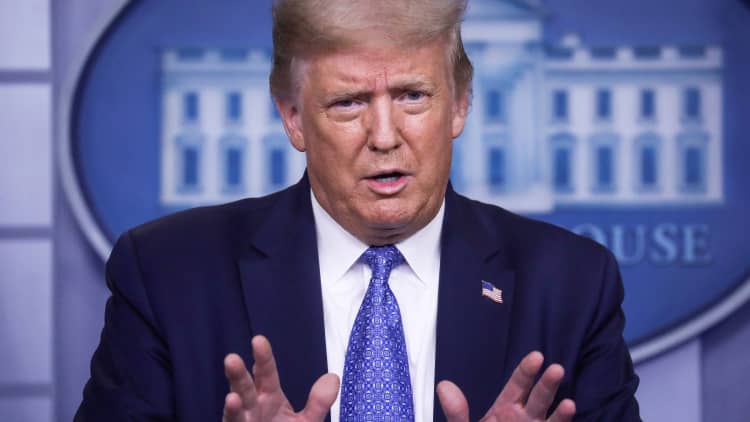
President Donald Trump called the federal government's $1.95 billion deal with Pfizer and biotech firm BioNTech "a historic agreement" that will help the country distribute a coronavirus vaccine in record-breaking time.
"Hopefully the approval process will go very quickly, and we think we have a winner there. We also think we have other companies right behind that are doing very well on the vaccines, long ahead of schedule," Trump told reporters at the White House on Wednesday.
Germany-based BioNTech and Pfizer, which are jointly developing four potential vaccines, announced the deal earlier in the day that will give the U.S. 100 million doses of their potential vaccine if it proves safe and effective. Under the agreement, the U.S. can buy 500 million additional doses, the Department of Health and Human Services said.
The deal was the largest deal so far to secure the nation's supply of coronavirus vaccine doses.
"This is another crucial step and our effort to develop, manufacture and distribute a vaccine in record-breaking time, really a very small fraction of the time based on previous schedules," Trump said.
If the vaccine is approved as safe and effective, Pfizer will begin to deliver doses to locations across the U.S. at the government's direction, according to HHS. The companies previously said they hope to begin a large trial with up to 30,000 participants later this month.
The president also said the administration was working with the states to ensure hospitals had an adequate supply of Gilead Sciences' antiviral drug remdesivir, which has been effective in treating some seriously ill coronavirus patients.
Trump said the U.S. was doing "tremendously well" on therapeutic research and in developing potential vaccines.
"We'll see what happens but that would be great, if we could just go into the hospital and just cure people and we're at a position where we're actually able to a certain extent with what we have right now and we think in a very short period of time we'll be able to do that," he added.
Trump's comments come as the number of coronavirus cases across the country have climbed in recent weeks, especially in states in the Sun Belt region. He said Wednesday that officials are "monitoring and aggressively acting to control the infection in Texas, Arizona, California, Florida."
Trump pointed to a number of reasons for the rise in infections. He said that protests over the police killing of George Floyd, an unarmed Black man, "presumably triggered a broader relaxation" of coronavirus mitigation efforts, a substantial increase in travel and increased gatherings on the nation's beaches and in packed bars.
The president also suggested Mexico may play a role in the rise in cases, saying the U.S. shares a 2,000-mile border with the country where "cases are surging very sharply," he said.


